-
 Bitcoin
Bitcoin $106,731.2224
-1.05% -
 Ethereum
Ethereum $2,444.9804
-1.20% -
 Tether USDt
Tether USDt $1.0003
0.01% -
 XRP
XRP $2.1882
0.09% -
 BNB
BNB $651.1435
-0.61% -
 Solana
Solana $148.3252
-2.09% -
 USDC
USDC $1.0000
0.01% -
 TRON
TRON $0.2787
0.55% -
 Dogecoin
Dogecoin $0.1598
-3.16% -
 Cardano
Cardano $0.5520
-2.43% -
 Hyperliquid
Hyperliquid $39.0960
-2.64% -
 Bitcoin Cash
Bitcoin Cash $516.9519
2.98% -
 Sui
Sui $2.7011
-2.95% -
 Chainlink
Chainlink $13.0582
-1.71% -
 UNUS SED LEO
UNUS SED LEO $8.9250
-2.53% -
 Stellar
Stellar $0.2359
-0.18% -
 Avalanche
Avalanche $17.3856
-3.73% -
 Toncoin
Toncoin $2.8095
-3.56% -
 Shiba Inu
Shiba Inu $0.0...01121
-1.95% -
 Litecoin
Litecoin $85.2795
-0.85% -
 Hedera
Hedera $0.1471
-2.15% -
 Monero
Monero $319.8004
1.12% -
 Dai
Dai $1.0001
0.01% -
 Ethena USDe
Ethena USDe $1.0001
0.02% -
 Bitget Token
Bitget Token $4.5344
-1.07% -
 Polkadot
Polkadot $3.3224
-2.96% -
 Uniswap
Uniswap $6.9697
-2.75% -
 Aave
Aave $266.1658
-2.25% -
 Pepe
Pepe $0.0...09414
-3.41% -
 Pi
Pi $0.4913
-3.29%
What is the difference between public key and private key?
Secure cryptocurrency transactions rely on a public key (like an email address, for receiving funds) and a private key (a secret code, controlling access). Losing the private key means irreversible loss of funds; protecting it is paramount.
Mar 14, 2025 at 08:35 pm
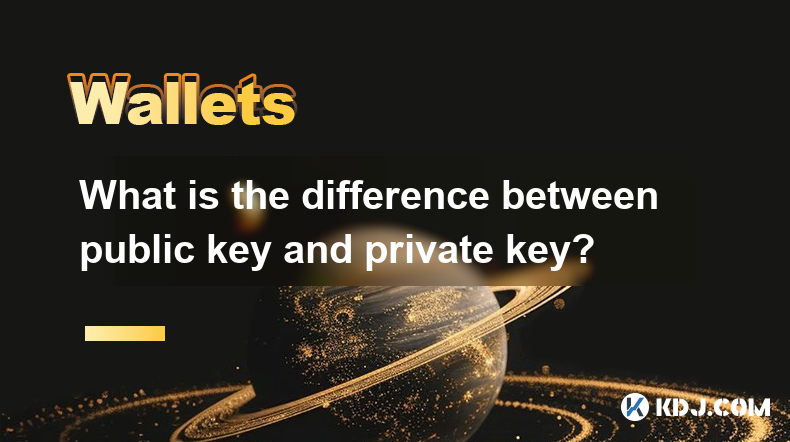
Key Points:
- Public Key: A cryptographic address, like an email address, used to receive cryptocurrency. It's publicly shareable without compromising security.
- Private Key: A secret code, like a password, granting exclusive access and control over the associated cryptocurrency. Its secrecy is paramount.
- Asymmetric Encryption: The core principle underlying public and private key cryptography, enabling secure transactions.
- Security Implications: Losing your private key means losing access to your funds irrevocably. Protecting your private key is crucial.
- Key Generation & Storage: Different wallets and methods exist for generating and securely storing these keys.
What is the difference between public key and private key?
The fundamental difference between a public key and a private key lies in their function and security implications within the context of cryptocurrency. They are two halves of a cryptographic key pair, working together to enable secure transactions and ownership verification on a blockchain. Think of it like a mailbox (public key) and the key to that mailbox (private key).
Public Key: Your Crypto Address
Your public key is essentially your cryptocurrency address. It's a string of alphanumeric characters that you share with others when receiving payments. Anyone can see your public key without compromising your funds. It's analogous to providing your email address – you're allowing people to send you messages (cryptocurrency). The public key allows verification of transactions sent to you. This ensures that only you can access the funds sent to your public key.
Private Key: The Master Key
The private key, on the other hand, is a secret code that grants you exclusive control over your cryptocurrency. It's like the key to your digital wallet. Only you should know your private key. This key is used to sign transactions, proving that you are the legitimate owner authorizing the transfer of funds from your wallet. Losing or compromising your private key means irreversible loss of access to your cryptocurrency.
Asymmetric Encryption: The Underlying Mechanism
Public and private keys function through a system called asymmetric encryption. This cryptographic technique utilizes two separate keys—a public key for encryption and a private key for decryption. When someone sends you cryptocurrency, the transaction is encrypted using your public key. Only your private key can decrypt this transaction, proving ownership and allowing you to access the funds. This one-way encryption ensures secure and verifiable transactions.
Security Implications: The Importance of Private Key Protection
The security of your cryptocurrency hinges entirely on the secrecy of your private key. If your private key is lost, stolen, or compromised, you will lose access to your funds. There is no recovery process. This underscores the critical importance of securely storing your private key using methods like hardware wallets, strong password management, and avoiding phishing scams.
Key Generation and Storage Methods
Several methods exist for generating and storing your key pair.
- Software Wallets: These are applications installed on your computer or mobile device. They offer varying levels of security.
- Hardware Wallets: These are physical devices designed for secure key storage. They are considered the most secure option.
- Paper Wallets: Your public and private keys are printed on paper for offline storage. This method requires careful handling to prevent damage or loss.
Understanding the Mathematical Basis (Simplified)
The generation of public and private keys involves complex mathematical algorithms. These algorithms ensure that deriving the private key from the public key is computationally infeasible. This asymmetry is the foundation of secure cryptocurrency transactions. It's a one-way function, making it virtually impossible to deduce the private key from the public key.
Common Questions and Answers:
Q: Can I share my public key without compromising my security?
A: Yes, your public key is designed to be shared publicly. It's like your email address – necessary for receiving funds but doesn't compromise your security.
Q: What happens if I lose my private key?
A: If you lose your private key, you permanently lose access to the cryptocurrency associated with it. There is no way to recover it.
Q: Are all cryptocurrency wallets the same in terms of key management?
A: No, different wallets offer varying levels of security and key management features. Hardware wallets are generally considered the most secure option.
Q: How are public and private keys generated?
A: They are generated using cryptographic algorithms, employing complex mathematical functions to ensure security and asymmetry. The exact methods vary depending on the wallet or system used.
Q: Can I recover my private key if I forget it?
A: No, there's no recovery mechanism for lost private keys. This is a fundamental aspect of cryptocurrency security. The security depends entirely on the user's ability to protect their private key.
Q: What is the best way to store my private key?
A: The best method is using a hardware wallet, which provides offline storage and multiple security layers. Other options include secure software wallets and paper wallets, but these require diligent security practices.
Q: What are the risks associated with sharing my private key?
A: Sharing your private key gives anyone complete control over your cryptocurrency. This could lead to the loss of all your funds. Never share your private key with anyone under any circumstances.
Disclaimer:info@kdj.com
The information provided is not trading advice. kdj.com does not assume any responsibility for any investments made based on the information provided in this article. Cryptocurrencies are highly volatile and it is highly recommended that you invest with caution after thorough research!
If you believe that the content used on this website infringes your copyright, please contact us immediately (info@kdj.com) and we will delete it promptly.
- Cold Wallet, Token, Gains: Is CWT the Smartest Crypto Move?
- 2025-07-02 01:10:12
- Pi Coin's Rocky Ride: Support Levels, Recovery Timeline, and What the Experts Are Saying
- 2025-07-02 01:10:12
- Shiba Inu, Ozak AI, and Cryptocurrency: Navigating the Meme Coin Maze
- 2025-07-02 01:15:12
- Solana Meme Coin Mania: Trading Bots Take Center Stage
- 2025-07-02 01:15:12
- UniCredit, Bitcoin, and BlackRock ETF: A New Era of Crypto Investment?
- 2025-07-02 00:30:12
- UniCredit, Bitcoin ETF, and BlackRock: A New York Minute on Crypto's Big Players
- 2025-07-02 00:30:12
Related knowledge
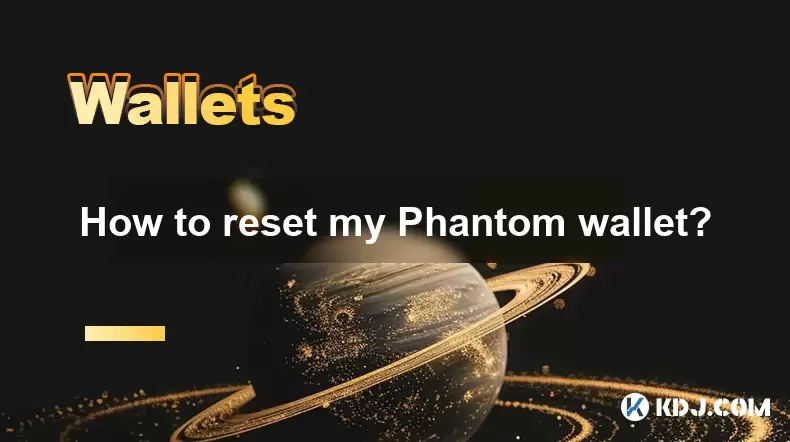
How to reset my Phantom wallet?
Jul 02,2025 at 12:36am
Understanding the Need for Resetting Your Phantom WalletIf you're using a Phantom wallet, you may encounter situations where resetting your wallet becomes necessary. This could be due to forgotten passwords, seed phrase issues, or account corruption. Phantom is a non-custodial wallet primarily used for interacting with the Solana blockchain, and it stor...
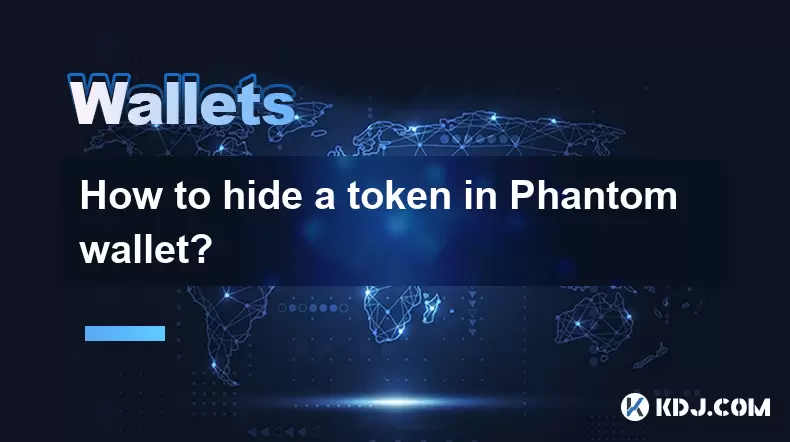
How to hide a token in Phantom wallet?
Jul 01,2025 at 05:49pm
Understanding the Phantom Wallet InterfacePhantom wallet is a popular non-custodial wallet used primarily for interacting with the Solana blockchain. It allows users to store, send, receive, and manage various tokens, including both fungible and non-fungible tokens (NFTs). Before attempting to hide a token, it's essential to understand how the wallet in...
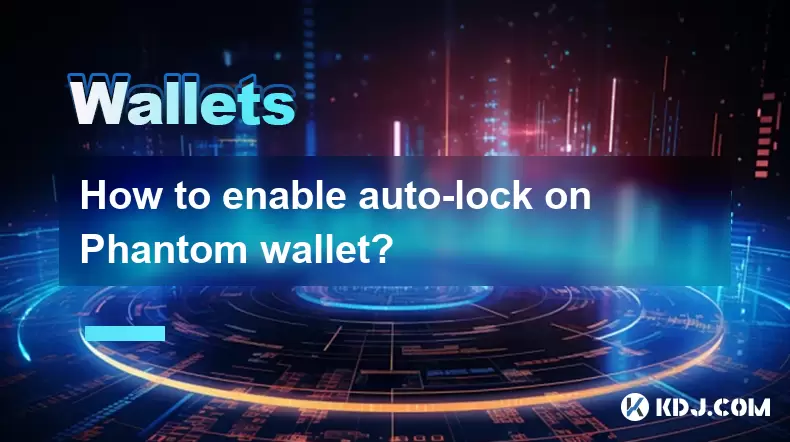
How to enable auto-lock on Phantom wallet?
Jul 01,2025 at 04:01pm
What is Auto-Lock in Phantom Wallet?Phantom wallet is a popular non-custodial cryptocurrency wallet used primarily for interacting with the Solana blockchain. One of its security features includes the ability to set an auto-lock timer, which ensures that the wallet locks itself automatically after a period of inactivity. Auto-lock enhances security by p...
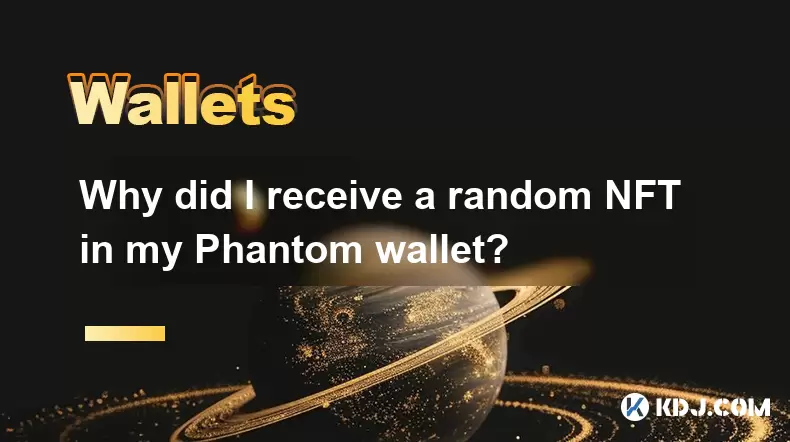
Why did I receive a random NFT in my Phantom wallet?
Jul 01,2025 at 09:00pm
Receiving an Unexpected NFT in Your Phantom WalletIf you've recently opened your Phantom wallet and noticed an unfamiliar NFT appearing in your collection, you're not alone. Many users have reported receiving random or unsolicited non-fungible tokens, often without any prior interaction with the project or sender. This phenomenon has become increasingly...
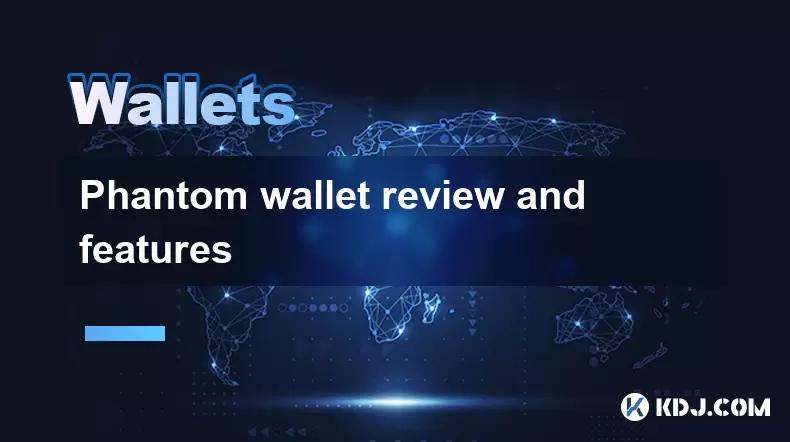
Phantom wallet review and features
Jul 02,2025 at 01:28am
What is Phantom Wallet?Phantom wallet is a non-custodial cryptocurrency wallet specifically designed for the Solana blockchain. It allows users to store, send, receive, and interact with decentralized applications (dApps) on the Solana network seamlessly. Unlike traditional wallets that may require intermediaries, Phantom ensures complete control remain...
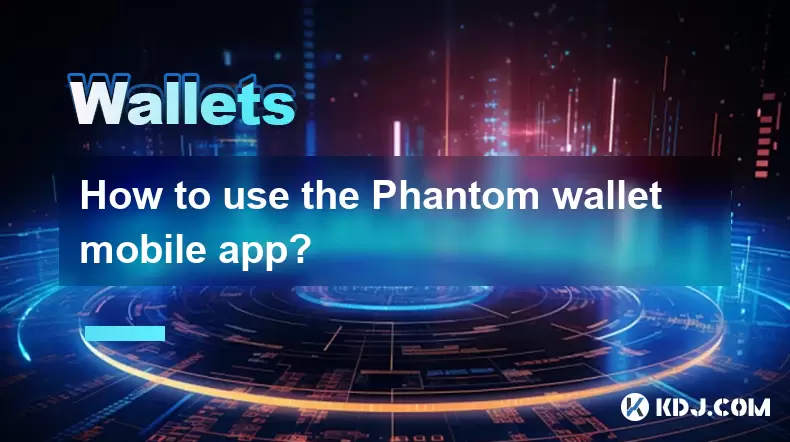
How to use the Phantom wallet mobile app?
Jul 02,2025 at 01:49am
What is the Phantom Wallet Mobile App?Phantom wallet is one of the most popular non-custodial cryptocurrency wallets in the Solana ecosystem. It allows users to securely store, send, receive, and interact with decentralized applications (dApps) on the Solana blockchain. The mobile version of the Phantom wallet offers a seamless experience for managing S...

How to reset my Phantom wallet?
Jul 02,2025 at 12:36am
Understanding the Need for Resetting Your Phantom WalletIf you're using a Phantom wallet, you may encounter situations where resetting your wallet becomes necessary. This could be due to forgotten passwords, seed phrase issues, or account corruption. Phantom is a non-custodial wallet primarily used for interacting with the Solana blockchain, and it stor...

How to hide a token in Phantom wallet?
Jul 01,2025 at 05:49pm
Understanding the Phantom Wallet InterfacePhantom wallet is a popular non-custodial wallet used primarily for interacting with the Solana blockchain. It allows users to store, send, receive, and manage various tokens, including both fungible and non-fungible tokens (NFTs). Before attempting to hide a token, it's essential to understand how the wallet in...

How to enable auto-lock on Phantom wallet?
Jul 01,2025 at 04:01pm
What is Auto-Lock in Phantom Wallet?Phantom wallet is a popular non-custodial cryptocurrency wallet used primarily for interacting with the Solana blockchain. One of its security features includes the ability to set an auto-lock timer, which ensures that the wallet locks itself automatically after a period of inactivity. Auto-lock enhances security by p...

Why did I receive a random NFT in my Phantom wallet?
Jul 01,2025 at 09:00pm
Receiving an Unexpected NFT in Your Phantom WalletIf you've recently opened your Phantom wallet and noticed an unfamiliar NFT appearing in your collection, you're not alone. Many users have reported receiving random or unsolicited non-fungible tokens, often without any prior interaction with the project or sender. This phenomenon has become increasingly...

Phantom wallet review and features
Jul 02,2025 at 01:28am
What is Phantom Wallet?Phantom wallet is a non-custodial cryptocurrency wallet specifically designed for the Solana blockchain. It allows users to store, send, receive, and interact with decentralized applications (dApps) on the Solana network seamlessly. Unlike traditional wallets that may require intermediaries, Phantom ensures complete control remain...

How to use the Phantom wallet mobile app?
Jul 02,2025 at 01:49am
What is the Phantom Wallet Mobile App?Phantom wallet is one of the most popular non-custodial cryptocurrency wallets in the Solana ecosystem. It allows users to securely store, send, receive, and interact with decentralized applications (dApps) on the Solana blockchain. The mobile version of the Phantom wallet offers a seamless experience for managing S...
See all articles

























































































